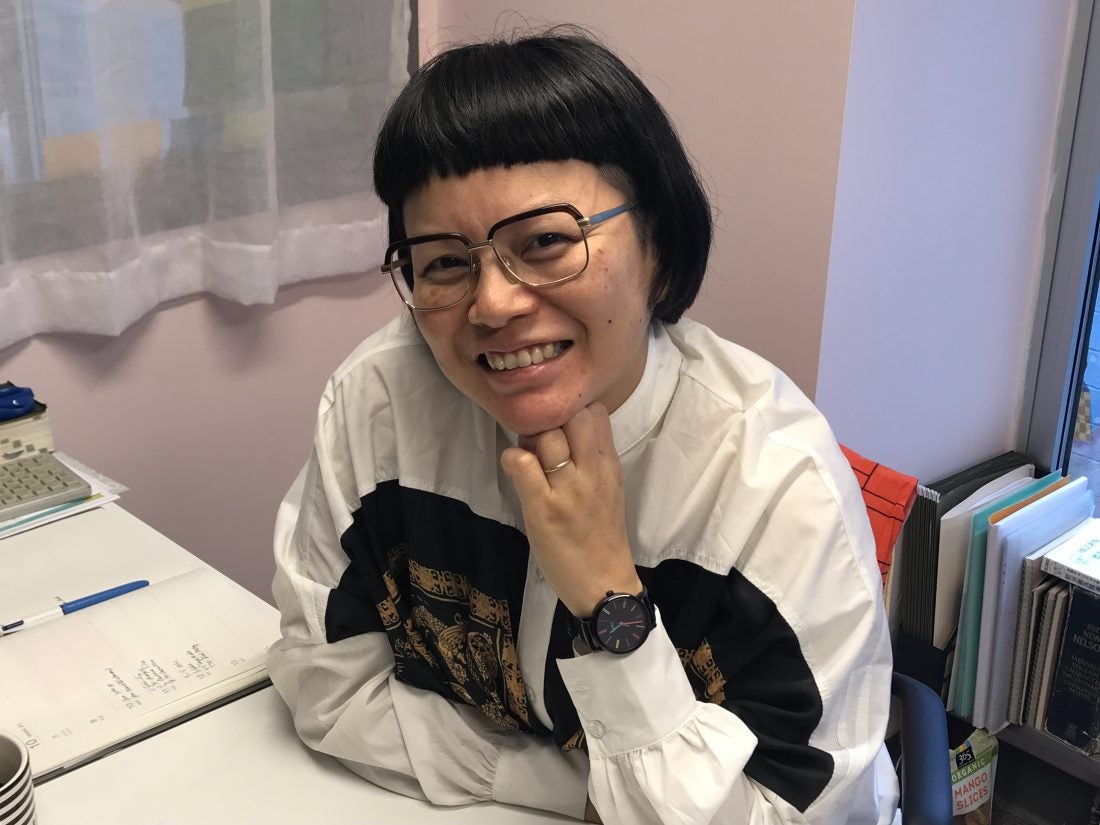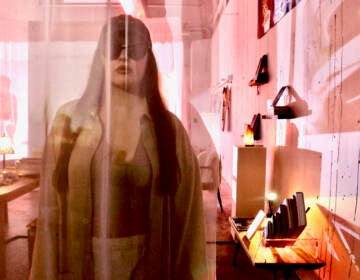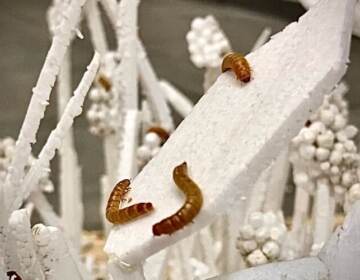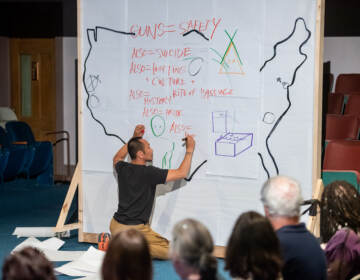Asian Arts Initiative leader shaping cultural, civic identity in Philly
Morning Edition host Jennifer Lynn speaks with Anne Ishii about her new role as executive director of Asian Arts Initiative.
Listen 5:45
Anne Ishii is the executive director of Asian Arts Initiative in Philadelphia. (Jennifer Lynn/WHYY)
The intersection of 12th and Vine streets could be considered the gateway or backdoor to Philly’s Chinatown, a neighborhood that’s also referred to as Callowhill. It sports new lofts, condominiums and the evolving Rail Park.
It’s also home to Asian Arts Initiative. It serves as a meeting place and support system for artists and others who are eager to shape cultural and civic identity, and it has a new leader: Anne Ishii.
Ishii has formed culture as a publisher, book promoter, and writer. A part-time resident of New York, she grew up outside of Los Angeles where cultural, racial, and economic circumstances influenced her. Her father is Japanese, and her mother is Korean.
During a conversation in Ishii’s Philadelphia office here, she and Morning Edition host Jennifer Lynn touched on many topics — including the story of Ishii’s coming of age at the time of the Rodney King verdict in the early ’90s.
—
My father had a factory in Compton when the riots broke out after the verdict was announced. So I grew up in LA during a time when there was this weird confluence of conflict between — not just Asians and the rest of America — but specifically Koreans and blacks and then between the Japanese sort of economic sector and the American economic sector. This is circa Toyota taking over market share, Ford and then everybody saying that the Japanese were taking the jobs, and we experienced a lot of that sort of hate sentiment as a family. Just a lot of really terrible things yelled at us and signs everywhere, which feels kind of surreal to look back on.
I’ve spent the last 15 years marketing Japanese pop culture, and Americans can’t get enough of it, so it’s really surreal to me, literally going from being bullied, specifically for being Japanese, in the ’80s to now being borderline fetish.
Asian Arts Initiative opened its doors 25 years ago, right after the Rodney King verdict in Los Angeles on white police officers beating the heck out of King. And people can Google the story if they’re not familiar, maybe some of our younger listeners are not, but AAI starts right after that time period which was pivotal to your life. It’s very interesting symmetry.
Yeah, absolutely. That’s not lost on me at all. It’s really sad to me when I think about where the police state is in terms of social justice issues. You know grainy video footage of a black man getting beat up feels almost kind of quaint compared to being gunned down.
I think about what this means as it provokes more movement and more social activity, more art practice. And I actually resent being told that bad times will create better art. You know that this is a really motivating time, inspirational time. I’d much rather have peace and no police violence. It is a very strange symmetry. Yeah, just witnessing that chaos upfront and then working with an organization that came out of that rubble.
I’ve always viewed the Asian Arts Initiative as an arts arm and social motivator or sometimes the social motivates the art.
I think the thing about the arts and, especially in the Asian-American community or in the Asian diaspora, it’s hard to understand the significance of something that doesn’t feel as obvious as science and technology. Stereotypically, for better or for worse, I think in Asian communities it’s not really viewed as a priority to hone your artistic temperament or your practice. I’m hoping that the community finds that these are really important ways that we grow as people, but also that it contributes significantly to how we contribute to the social fabric in the community. A lot of that is learning how to find self-expression and some confidence and the ability to speak your mind. And I know the community really needs to learn that as well. So, yeah absolutely.
Are you getting a chance to get to know the community that you’re going to be representing? This area is gentrifying.
Absolutely. Coming in, I had no idea that I was going to be dropped in the middle of this really robust conversation about what it means for the neighborhood to change and whether the growth is good or bad. We hear gentrification, and we know that that’s a negative signifier. But we hear words like development and improvement, and those are supposed to mean good things too. But it’s nuanced, it’s a little more complicated than just ‘let’s build parks and housing.’ It has to be affordable and accessible. So those are things that I’m definitely paying attention to.
I see your role as director of this program as being a civil rights leader.
Maybe one day.
Well, we were just talking about the theme at Asian Arts Initiative. A lot of the programming coming up is under the theme of labor, and they’re all wonderful eclectic events. And then it ties in with your state of being at the moment. You are pregnant with your first child, and there will be some laboring going on.
That’s right. It didn’t come together to me until you just said it right now actually. I’ll cap off the whole season by going into labor myself.
It’s been nice getting to know you. Thank you so much for your time.
Thank you so much, Jennifer.
WHYY is your source for fact-based, in-depth journalism and information. As a nonprofit organization, we rely on financial support from readers like you. Please give today.





